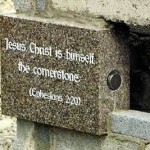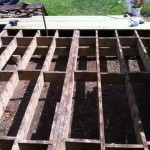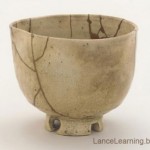 Christ is made the sure foundation,
Christ is made the sure foundation,
Christ the head and cornerstone,
chosen of the Lord, and precious,
binding all the Church in one;
holy Zion’s help for ever,
and her confidence alone.
These words from a 19th century hymn, sung to the majestic tune of Westminster Abbey, came to mind as we set foot on our deck shortly after all the boards had been replaced. (You can listen to it here)
The expression “sure foundation” comes from the Old Testament: So this is what the Sovereign Lord says: “See, I lay a stone in Zion, a tested stone, a precious cornerstone for a sure foundation; the one who relies on it will never be stricken with panic.” (Isaiah 28:16)
As we saw in yesterday’s DWOD, Jesus is named as the foundation on which we build (I Corinthians 3:10). Jesus is also the cornerstone. (Ephesians 2:20).
When we know for sure that we build on the sure foundation/cornerstone of Jesus Christ, then we “will never be stricken with panic.” In other words, we will have a confidence that cannot be shaken.
Getting back to our deck…when Bruce Ingram assured us that the framework on which the boards were bolted down was solid, then we could go ahead and replace them, knowing that the deck would withstand any pressure applied to it.
We could host a party with a dozen people standing on the deck. There would be no reason to worry, let alone panic. Because we have a sure foundation!
The apostle Paul says in his second letter to Timothy, chapter 2 verse 19: Nevertheless, God’s solid foundation stands firm, sealed with this inscription: “The Lord knows those who are his,” and, “Everyone who confesses the name of the Lord must turn away from wickedness.”
Once again, we see a reference to the confidence that comes from a firm foundation.
The first and foremost reason for this confidence is our identity. Our heavenly Father knows that we are His. And we know that we are His.
Secondly, we can be confident when we confess the name of the Lord Jesus. We are sealed by the covenant of His blood. We bear His name. (Christians=little Christs).
Thirdly, our confidence comes when we make a conscious choice to turn away from wickedness. This is not a reference to the turning around (repentance) that precedes confessing the name of Jesus as Lord. This is about repeatedly turning away from wickedness when we are faced with the temptation to give in to it—by the power of the Holy Spirit.
Dear DWOD friend, do you walk through life with confidence no matter what the circumstance? You can, if you base your confidence on these three foundational truths.
- The Father knows who you are and you know that you are His.
- Jesus Christ is the Lord you confess.
- Holy Spirit is in you helping you turn away from wickedness.
Now you can continue to step out boldly towards your destiny, because you have a sure foundation.








Follow Us